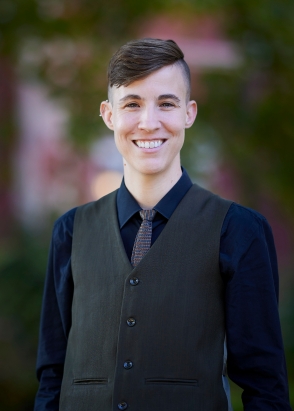What drew you to the Department of Religious Studies at OU?
Mallette: First and foremost, I was drawn to the critical questions being asked by OU’s Department of Religious Studies. In both their teaching and research, the faculty here are asking pressing questions about how religion intersects with different facets of social power – things like economics, Black popular culture, understandings of gender, and the politics of translation. Moreover, because interdisciplinary collaborations have been central to my work at the nexus of religious studies, gender studies and contemporary Christian thought, it is also wonderful to see the remarkable collegiality, generosity and curiosity of faculty across departments and fields. It makes OU a very exciting place to work, write, teach and think.
I was also drawn to the idea of teaching courses on religion and Christianity in a public university context. In my teaching, I love engaging students’ questions about the perils and promises of how religion intersects with U.S. public life in relation to race, class, gender, sexuality and colonialism. In getting to know the OU community, I’ve noticed that these questions are something that students here are passionate about – both in the classroom and in their activist engagements.
What attracted you to researching and pursuing a career focused on religious studies as well as women's, gender and sexuality studies?
Mallette: The first religion class I ever took was a required one (it was a course called “The Christian Tradition”), so I certainly wasn’t expecting to pursue religious studies as a career. While I came to that class with the suspicion that religion and theology had little to say to my political concerns, I was surprised when that course confronted me with critical questions about gender, race, sexuality and colonialism. That class introduced me to a fascinating range of Christian views and debates throughout history, ranging from ancient Christian writers to contemporary feminist and womanist (or Black feminist) theologies.
This meant that my introduction to the study of religion coincided with my first introduction to women’s, gender and sexuality studies. After that first class, I found myself taking all of the courses that I could fit into my schedule that dealt with these topics.
After graduating college, I tried out working in the world of small nonprofits. I was fortunate to spend a year on staff at the Women’s Alliance for Theology, Ethics and Ritual, an organization located just outside of Washington, D.C., that uses feminist religious resources for social change. There, I was able to be part of feminist conversations about religion and activism that helped me realize that I had my own questions that I wanted to pursue in graduate studies at the intersection of religious studies and women’s, gender and sexuality studies.
Can you talk about any exciting upcoming projects you may be working on, or any favorite projects you have already finished?
Mallette: I’m currently working on a book manuscript, Lesbian Feminist Killjoys: Sin, Pessimism, and Queer Histories.It’s a project that brings the histories of LGBTQ political movements of the 1960-1980s into conversation with the concept of social sin as developed by various progressive movements within Christianity.
I focus on four lesbian feminist writers – Beverly Smith, Andrea Dworkin, Pat Parker and Jill Johnston – and draw out how their writings offer queer resources to examine sex’s imbrications with racism, capitalism, anti-Semitism and so forth. What I love about these four writers is the way that they are unabashed feminist killjoys: they have a pretty pessimistic take on the world that leads them to critique things that many others associate with happiness (things like marriage, capitalism and the nuclear family). Yet despite their pessimism, the passions, feelings and desires that they express in their manifestos, poetry and books also helped bring about new political movements. I recently published an article related to this project in WSQ: Women’s Studies Quarterly that focuses on the contributions of the Black lesbian feminist Beverly Smith to feminist and queer history.
What advice do you have for college students today?
Mallette: I always recommend that students go to office hours and get to know their professors. I think that many of us have the tendency to avoid speaking up or asking questions whenever we’re uncertain or confused about something, but I’ve found that some of my most fascinating conversations and learning (as both a student and a teacher) happen while seeking clarification during office hours. For instance, a question that I raised after hearing a professor give a lecture on queer theology that I found utterly confusing (but also intriguing!) led me to take an independent study with that professor on feminist and queer theory, which wasn’t something that my undergraduate institution offered.
What do you like to do when you aren't working?
Mallette: I enjoy biking around everywhere. As someone without a car, I’m a huge proponent of Norman’s and Oklahoma City’s public transit system. I also really like to cook and bake, especially from cookbooks. Most recently, I’ve been working my way through Yotam Ottolenghi and Ixta Belfrage’s cookbook, Flavor.


